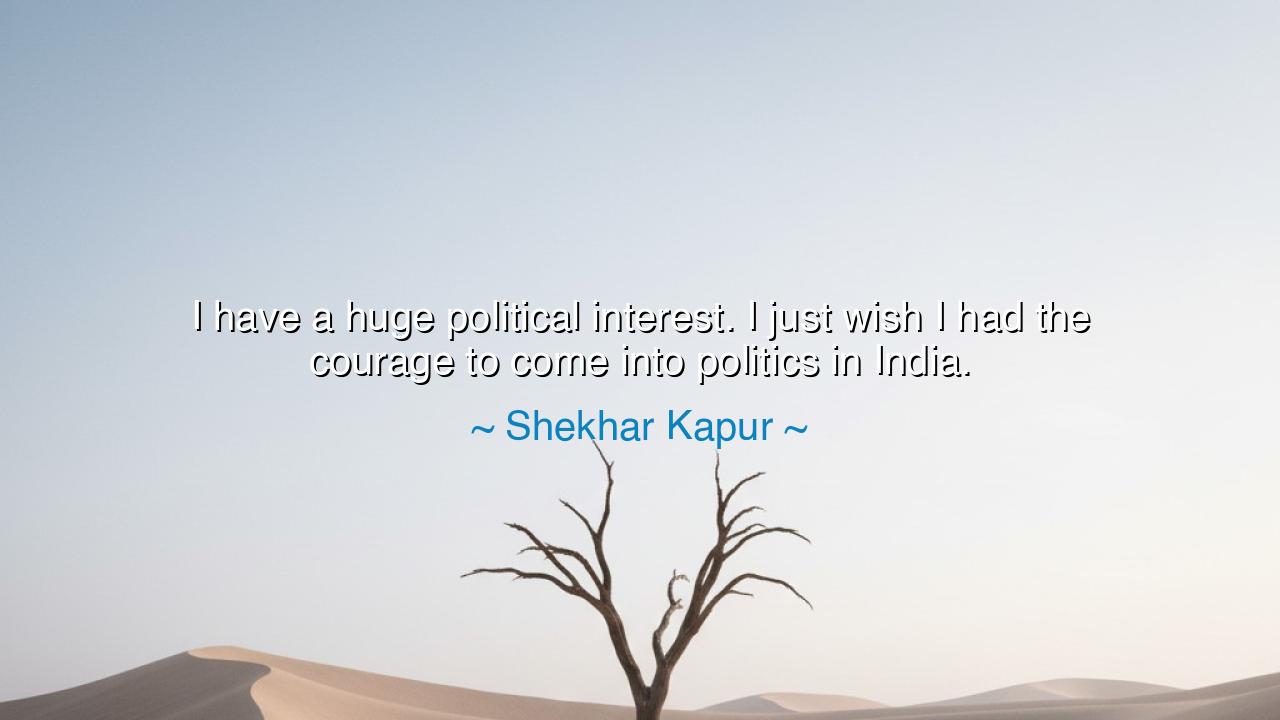
I have a huge political interest. I just wish I had the courage
I have a huge political interest. I just wish I had the courage to come into politics in India.






“I have a huge political interest. I just wish I had the courage to come into politics in India.” — Thus spoke Shekhar Kapur, the visionary filmmaker whose works have explored the struggles of power, destiny, and human conscience. In these few words, he reveals a truth that echoes across the ages: that interest without courage is like a seed that never takes root. He speaks not merely of politics, but of the universal human hesitation — that gulf between knowing one’s calling and daring to pursue it. His confession is not weakness, but honesty; and in it lies a mirror for every soul that has ever dreamed of shaping the world but trembled before its storms.
To understand his words, one must know the land he speaks of — India, vast and vibrant, a civilization ancient as the dawn and complex as the cosmos. In that nation, politics is not a game of convenience but a crucible of endurance. It is the arena where idealism meets corruption, where truth battles deception, and where the brave are tested not once, but endlessly. Many have entered it with noble hearts and left with scarred spirits. To wish to serve one’s country through politics is to invite both glory and pain — and thus, Kapur’s yearning carries the weight of realism. He does not lack passion, but he recognizes the price of conviction.
The ancients would have understood this struggle. Plato spoke of the philosopher-king — the one who knows the good and dares to govern by it. Yet he lamented that most wise men shrink from power, preferring contemplation to confrontation. And so, the world often falls to those who seek power, not those who understand it. In Kapur’s lament, we hear that same ancient sorrow: that wisdom, though plentiful, too often hesitates before the throne of action. To enter politics with integrity is to walk among serpents barefoot, armed only with truth. It is not cowardice to hesitate; it is awareness of the peril that awaits.
Yet history reminds us that courage is not the absence of fear, but the mastery of it. Think of Mahatma Gandhi, who stepped into the heart of empire armed with nothing but faith and simplicity. He had no weapons, no armies — only the strength of his convictions. The British mocked him at first, as men often mock what they do not understand. But his moral power, his willingness to stand before violence without hate, shook an empire to its knees. Gandhi was not fearless; he was faithful. And that faith gave him the courage to transform politics into something sacred — a path of service rather than domination.
Shekhar Kapur, as an artist, has already walked the borderlands of politics through his films — from Bandit Queen, which unmasked the injustices of caste and gender, to Elizabeth, which explored the loneliness of leadership. His art, like the great dramas of the ancient world, has always been political in spirit — holding a mirror to power, corruption, and destiny. Yet he confesses that to step directly into the political realm demands a different kind of bravery. It is not the courage of imagination, but the courage of confrontation. To create is one thing; to govern, another. For in politics, one does not face fictional villains, but the living shadows of greed, deceit, and compromise.
Still, one must not let the fear of imperfection silence the call of service. For every nation, every generation, cries out for the courageous dreamers — those who dare to enter the arena, not because they believe they are pure, but because they believe the world can be better. The great philosopher Aristotle wrote that man is a political animal; to withdraw entirely from politics is to renounce part of one’s humanity. Even if one cannot hold office, one must hold conscience — speak truth, act justly, and shape society with the tools one has. If Kapur’s courage has not led him into parliament, it has led him into art — and that too is a form of leadership, for every story that awakens justice is itself a political act.
The lesson of his words is both humbling and profound: that the desire to change the world must be joined by the courage to engage with it, however flawed it may be. One cannot wait for purity before stepping into the fray, for the world is never pure. The noble heart must learn to act amid imperfection, to plant good seeds even in polluted soil. If fear holds you back from serving, let love push you forward — love for your people, for truth, for the generations yet unborn. For courage is not born from ambition, but from compassion.
So remember this, my child: every person has a politics — a sphere of influence, a realm where their choices shape the world. Do not stand at the edge of life, admiring those who dare. Step forward. Speak. Build. Challenge. Whether through art, through words, or through deeds, engage in the great work of humanity. And if ever you feel afraid, recall Shekhar Kapur’s confession — for in it lies the seed of your own awakening. To wish for courage is the first act of courage. To act upon it is the fulfillment of destiny.






AAdministratorAdministrator
Welcome, honored guests. Please leave a comment, we will respond soon